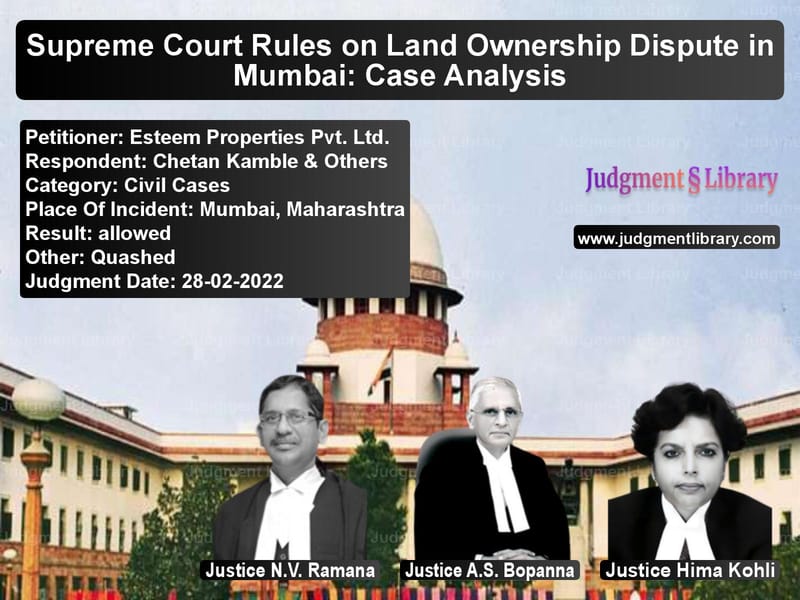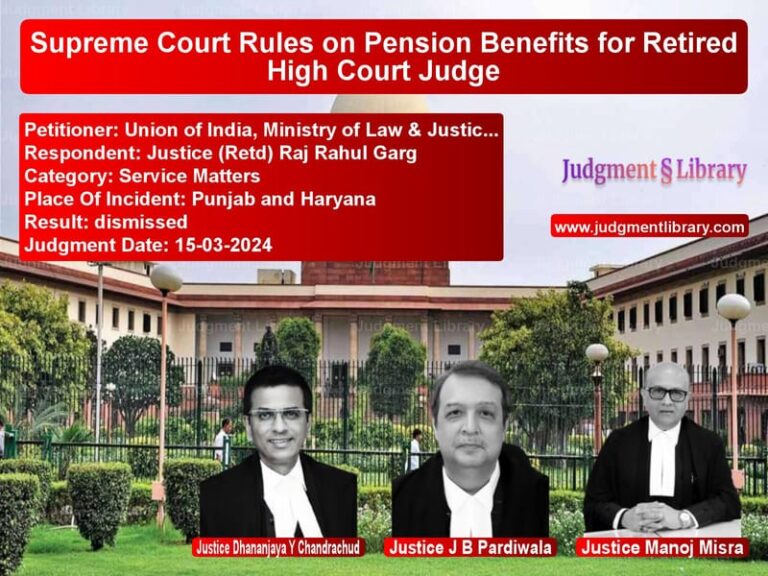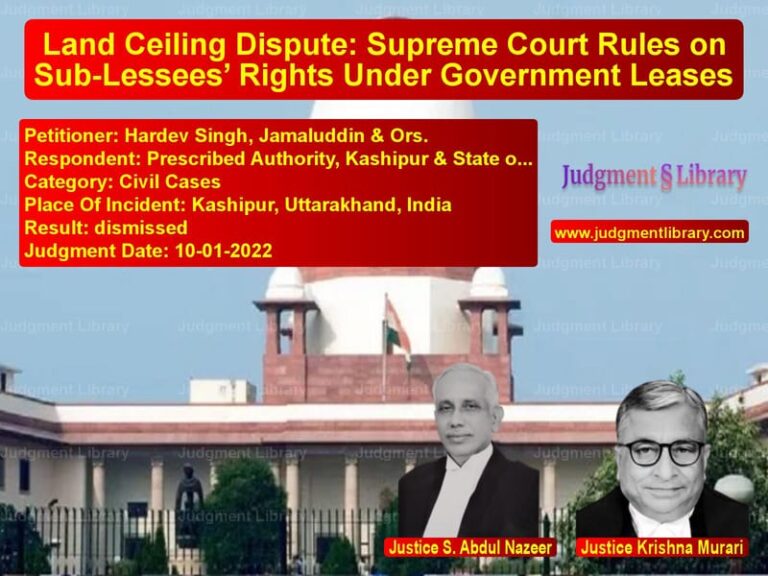Supreme Court Rules on Land Ownership Dispute in Mumbai: Case Analysis
The Supreme Court, in the case of Esteem Properties Pvt. Ltd. vs. Chetan Kamble & Others, examined a long-standing dispute over the ownership of prime land in Mumbai. The case revolved around the claims of the Gonsalves family and the subsequent transfer of property rights to Esteem Properties Pvt. Ltd.
Background of the Case
The dispute originated from a Public Interest Litigation (PIL) filed in the Bombay High Court challenging the ownership claims over land measuring 5 acres and 20 gunthas in CTS No. 229. The property was historically granted by the East India Company to the Khot of Kurla and later transferred to the Gonsalves family through a Deed of Exchange dated 12 March 1894.
In 1953, under the Salsette Estate (Land Revenue Exemption Abolition) Act, 1951, the land was declared government property. The Wadia Trust, successors of the Khot, challenged this declaration, but a Consent Decree in 1963 affirmed the government’s title. However, the Gonsalves family was not a party to this decree.
In 1969, a fresh city survey inquiry under the Maharashtra Land Revenue Code (MLR Code) reconfirmed the government’s ownership. The Gonsalves family challenged these findings through Civil Suit No. 698 of 1971, claiming that the orders were void and that they were the rightful owners.
Arguments by the Parties
Petitioner’s Arguments (Esteem Properties Pvt. Ltd.)
- The Gonsalves family had valid ownership rights based on the 1894 Deed of Exchange.
- The family had been in uninterrupted possession of the land for decades.
- The government’s classification of the land as state property was incorrect.
- The state had previously recognized their ownership in a 1995 order.
- The Bombay High Court erred in treating the PIL as maintainable when it was a private dispute.
Respondent’s Arguments (Chetan Kamble & Others)
- The land was declared government property in 1953, and this was affirmed by legal proceedings.
- The Gonsalves family was never officially recorded as owners in revenue records.
- The PIL was necessary to protect public property from unlawful private claims.
- Allowing the land to be transferred to Esteem Properties would cause financial loss to the state.
Supreme Court’s Key Observations
1. Locus Standi of PIL Petitioners
The Court questioned whether the PIL petitioners had the legal standing to challenge the ownership claims:
“The PIL was initiated by individuals with questionable credentials, and the dispute was a private matter between the state and the appellants.”
2. Legitimacy of the 1995 Revenue Minister’s Order
The Supreme Court analyzed the 1995 order that affirmed the Gonsalves family’s ownership:
“The state had previously recognized the claimants’ rights, and the subsequent ex-parte order of 1998 reversing this decision violated natural justice.”
3. Non-Participation in Previous Proceedings
The Court noted that the Gonsalves family was not included in the 1953 and 1963 proceedings:
“Legal proceedings determining ownership should have included all affected parties. The absence of the Gonsalves family undermines the state’s claim.”
4. Procedural Violations in Land Classification
The Court found that the state’s classification of the land was procedurally flawed:
“Land ownership cannot be arbitrarily altered without affording affected parties an opportunity to present their case.”
5. Rejection of the PIL
The Supreme Court criticized the Bombay High Court for entertaining the PIL:
“PILs should not be used to settle private disputes. The High Court overstepped by allowing third parties to intervene in an ownership matter.”
Final Judgment
The Supreme Court ruled as follows:
- The appeal by Esteem Properties Pvt. Ltd. was allowed.
- The Bombay High Court’s decision was set aside.
- The 1995 order recognizing the Gonsalves family’s ownership was reinstated.
- The PIL was dismissed as being non-maintainable.
Impact of the Judgment
This ruling has significant implications for property disputes:
- Limits misuse of PILs: Ensures that PILs are not used to interfere in private land disputes.
- Reaffirms property rights: Protects individuals from arbitrary state action.
- Emphasizes due process: Confirms that affected parties must be included in legal proceedings.
- Prevents state overreach: Limits government attempts to claim private land without proper legal basis.
The Supreme Court’s ruling reinforces legal protections for property owners and ensures that land disputes are resolved through due process rather than public interest litigation.
Petitioner Name: Esteem Properties Pvt. Ltd..Respondent Name: Chetan Kamble & Others.Judgment By: Justice N.V. Ramana, Justice A.S. Bopanna, Justice Hima Kohli.Place Of Incident: Mumbai, Maharashtra.Judgment Date: 28-02-2022.
Don’t miss out on the full details! Download the complete judgment in PDF format below and gain valuable insights instantly!
Download Judgment: esteem-properties-pv-vs-chetan-kamble-&-othe-supreme-court-of-india-judgment-dated-28-02-2022.pdf
Directly Download Judgment: Directly download this Judgment
See all petitions in Property Disputes
See all petitions in Landlord-Tenant Disputes
See all petitions in Specific Performance
See all petitions in Damages and Compensation
See all petitions in Judgment by N.V. Ramana
See all petitions in Judgment by A. S. Bopanna
See all petitions in Judgment by Hima Kohli
See all petitions in allowed
See all petitions in Quashed
See all petitions in supreme court of India judgments February 2022
See all petitions in 2022 judgments
See all posts in Civil Cases Category
See all allowed petitions in Civil Cases Category
See all Dismissed petitions in Civil Cases Category
See all partially allowed petitions in Civil Cases Category







